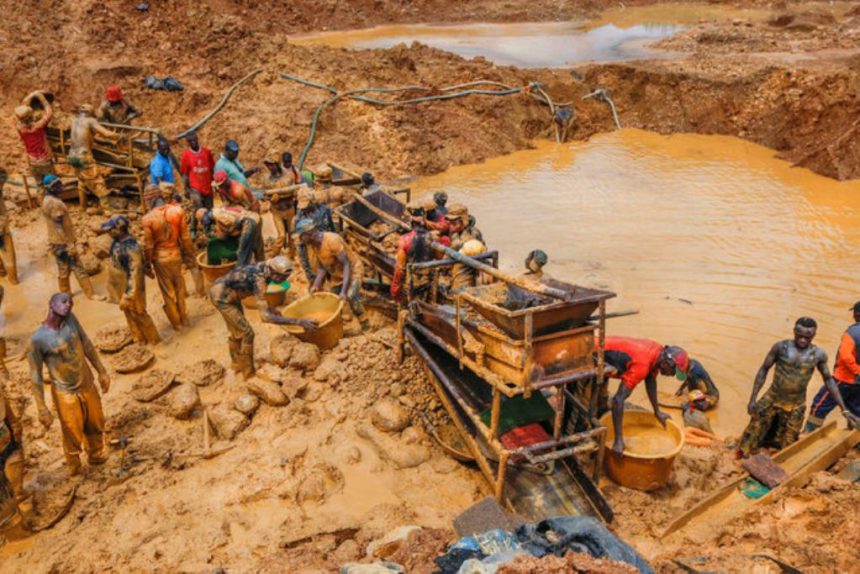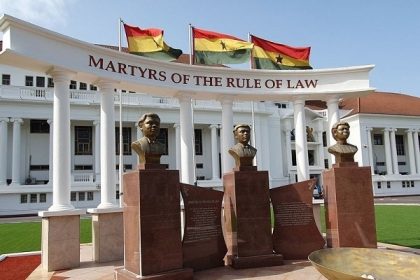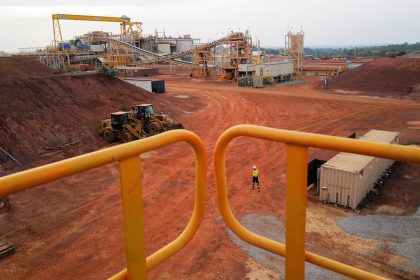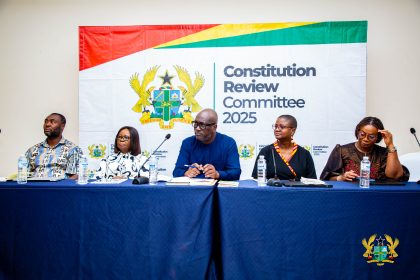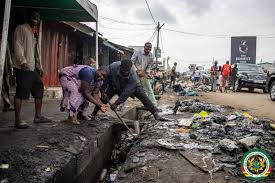Prologue: A Tragedy in the Sky
The recent helicopter crash that claimed the lives of Ghanaian statesmen traveling to inspect illegal mining sites in the country’s interior has unsettled me in ways I had not anticipated. These were men who boarded that aircraft not for ceremony but for duty—seeking, however imperfectly, to offer solutions to an ecological wound tearing at the nation’s fabric. Their deaths now hover over our public life as more than a misfortune. They represent, to me, a brutal metaphor of the nation’s descent: men of power falling from the sky while attempting to salvage poisoned rivers, collapsing forests, and fading sovereignties.
I could not help but wonder: if such a tragic fall symbolizes anything, it is that our current trajectory—of reactive enforcement, fragmented governance, and elite duplicity—has reached its limits. What, then, might it mean to reimagine Ghana’s fight against galamsey and ecological destruction with a futurist’s eye, not a utopian’s? The answer lies neither in nostalgic yearnings for a lost “Gold Coast” nor in simplistic crackdowns that make for good headlines but achieve little. It requires a systemic rethink, a strategy that acknowledges the entangled political economy of galamsey, the technological and diplomatic dimensions of modern ecological crime, and the moral demand for generational survival.
What follows is my attempt at such a rethinking—a hybrid text that is part essay, part policy report. It is written for policymakers, think tanks, scholars, and citizens who must confront the uncomfortable truth: galamsey is not just illegal mining. It is ecocide in motion, a systemic threat to Ghana’s sovereignty, economy, and future.
From Gold to Ecocide: The Anatomy of Collapse
Ghana’s history is inextricably tied to gold. Once celebrated as the Gold Coast, the nation entered independence with mineral wealth symbolizing both promise and peril. For centuries, artisanal mining was part of rural survival. Families panned rivers and dug shallow pits for subsistence, weaving gold into ritual, trade, and resilience.
But what was once artisanal has metastasized. Today, galamsey is no longer a desperate man’s pan for survival. It is a sprawling, organized, multi-billion-dollar underground economy. Its operations are financed by local politicians and business elites, powered by heavy machinery imported by foreign syndicates (often Chinese), and protected by state officials who moonlight as guardians of illicit sites. Its profits are laundered through shadow networks stretching from Accra to Dubai, Mumbai, and Beijing.
The consequences are catastrophic. Rivers like the Pra, Ankobra, Offin, and tributaries of the Volta run brown with mercury and cyanide. Forests—once vital biodiversity corridors and cocoa zones—are razed. Satellite images confirm what farmers already know: Ghana’s ecological body is bleeding.
What word suffices for this level of destruction? The language of “illegal mining” is too narrow. What we face is ecocide —the deliberate annihilation of ecosystems to the detriment of human survival. And in this ecocide lies the seed of political and social fragmentation: schools abandoned for quick cash, communities divided, chiefs corrupted, and the state’s moral authority weakened.
The Political Economy of Complicity
The persistence of galamsey is not a failure of knowledge; it is a failure of will, captured by vested interests.
Election cycles transform galamsey barons into political financiers. Politicians court them for money and mobilization. Chiefs, once guardians of land, are split: some resist, but others grant concessions for a share of the spoils. Military task forces sent to enforce anti-galamsey laws are themselves captured, often renting their guns to protect miners.
Internationally, the fungibility of gold makes enforcement almost impossible. Once smelted, illegal gold is indistinguishable from legal. Smuggling routes through Togo, Burkina Faso, and Côte d’Ivoire funnel Ghana’s gold into global markets. Dubai thrives as a laundering hub, importing West African gold with little due diligence. In effect, Ghana’s ecological destruction subsidizes global luxury.
This is not environmental mismanagement. It is a textbook case of elite complicity, transnational crime, and governance decay.
The Futility of Theatrics
Since the 1990s, Ghana has staged wave after wave of anti-galamsey campaigns. Soldiers march in, excavators are burned, miners arrested. Newspapers splash photos of decisive action. And then—silence. Within months, the operations collapse under corruption, legal loopholes, or elite interference. The cycle repeats.
Why? Because militarized crackdowns treat galamsey as a policing problem, not as a systemic crisis. Because formalization schemes, while laudable, are designed for bureaucrats in Accra rather than miners in Dunkwa-on-Offin. Because the institutional landscape is a jungle of overlapping authorities—Minerals Commission, Environmental Protection Agency, Forestry Commission, District Assemblies—each jostling for power and rent.
The result is tragic repetition: enforcement as spectacle, collapse as reality.
Lessons from Elsewhere
Ghana is not alone in confronting ecocidal mining economies. Other nations offer painful lessons.
In Peru and Colombia , illicit gold funds cartels. Authorities shifted from chasing miners to tracing money, deploying financial intelligence to follow the gold trail through banks and offshore accounts.
In Indonesia , community-based monitoring and revenue-sharing schemes have brought artisanal miners into formal frameworks. Villages see direct dividends, making enforcement a shared interest rather than a top-down imposition.
In Mongolia , “ninja miners”—artisanal diggers named for the green pans they carried like turtle shells—were integrated into cooperatives, supported with cleaner technology and structured access.
These examples do not offer a template, but they reveal a truth: solutions lie not in repression alone but in innovation, community empowerment, and financial disruption.
Toward a Futurist Policy Framework
If Ghana is to survive the age of galamsey, it must shift its frame. This is not about saving rivers alone. It is about redefining national security, economic sovereignty, and ecological survival .
First, galamsey must be reframed as a national security threat. Ecocide undermines food security, public health, and territorial sovereignty. To treat it as a nuisance is to invite collapse. A legal recognition of ecocide would allow Ghana to craft stronger instruments, invite international cooperation, and even pursue recognition of ecocide as a crime under international law.
Second, the state must attack the financial arteries of the shadow economy. A dedicated Financial Intelligence Taskforce should trace illicit gold revenues through banks, mobile money, and offshore transfers. Buyers must be compelled to conduct due diligence under OECD guidelines. Ghana must confront Dubai, India, and China diplomatically: ecological sovereignty cannot be traded for gold inflows.
Third, communities must be empowered, not criminalized. Instead of criminalizing every miner, Ghana should build “Green Mining Cooperatives” that allow small-scale miners to operate under collective licenses, equipped with cleaner technology and held accountable by community dividend systems. When villagers see royalties translating into schools and clinics, enforcement becomes self-sustaining.
Fourth, Ghana must deploy technology not as token spectacle but as systemic infrastructure. Satellite surveillance and drones should detect real-time illegal activity. A public galamsey map portal can foster citizen oversight. Blockchain could track gold from pit to port, raising the cost of laundering.
Fifth, ecological restoration must be central. A National Ecocide Restoration Fund, financed through government and international climate financing, should mobilize unemployed youth into eco-brigades to reclaim land and replant forests. This is not just environmental work—it is climate adaptation, food security, and employment strategy.
Finally, Ghana must look beyond its borders . Galamsey is a regional problem. Smuggling routes demand ECOWAS cooperation. Diplomatic pressure must push gold hubs to reform. Ghana should be at the forefront of global campaigns to criminalize ecocide internationally.
Barriers and Realpolitik
To imagine these reforms without acknowledging barriers would be naïve. Political elites who profit will resist. Communities who distrust state hypocrisy will doubt. Cleaner technologies cost money. International hubs like Dubai have little incentive to change.
But every society faces a moment when excuses expire. For Ghana, that moment is now.
The Fight for Generational Survival
The helicopter crash that opened this reflection reminds me that the stakes are not abstract. Men fell from the sky while seeking to stem ecological collapse. Their deaths should not become another fleeting tragedy. They should force us to confront the truth: galamsey is not a peripheral nuisance but an existential threat.
Future generations will not judge Ghana’s leaders by how many excavators they burned or how many speeches they gave. They will judge by whether the rivers still flowed, whether the cocoa farms still yielded, whether the forests still sheltered life.
The question before us is stark: Can Ghana act not merely to end galamsey, but to avert national self-destruction?
This is no utopian demand. It is the realist’s task of our century: to secure survival, sovereignty, and justice by refusing to trade rivers for gold.


